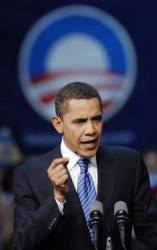
|
 |
 |
 Editorials | Opinions | January 2008 Editorials | Opinions | January 2008  
Time for a Meaningful Election?
 Thomas P.M. Barnett - Capitol Hill Blue Thomas P.M. Barnett - Capitol Hill Blue
go to original


| | Sen. Barack Obama (Reuters) | | |
Each GOP primary produces a new winner, none of them the longtime national frontrunner. Meanwhile, the Democrats feature a tight race between an African-American and a woman - pure history in the making. It can't get any better than that, the upshot being I might actually cast a ballot that matters for the first time in my life!

Some background:

I've never lived in one of those early primary states. Though I've dutifully voted in the preliminaries, I always went into the voting booth knowing beforehand what the next day's headline would read. That's pretty boring for a political scientist.

While I grew up and attended college in a classic swing state, Wisconsin, I reached voting age just in time for the Reagan revolution (1980 and 1984) to check my youthful liberalism. I moved to Massachusetts for grad school, and for George H.W. Bush's 1988 landslide. Mike Dukakis took his home state, much to my sense of newfound empowerment.

Then Bill Clinton comes along and I finally vote for a winner, except now I'm living in red state Virginia, so twice again (1992 and 1996) my vote accomplishes nada.

Compounding my political impotency, I next move to a true single-party state, Rhode Island, for the 2000 and 2004 elections. Of course, we go for Dems both times (Al Gore, John Kerry), helping to keep the national race close with our whopping three electoral votes. But guess what? George W. Bush didn't stand a chance there in either election, so I could have stayed home, confident -yet again -that my vote didn't matter one whit.

It gets a whole lot worse when you consider Congress, and here is where my background in Soviet studies makes me blush with embarrassment.

The old Supreme Soviet was basically a rubber stamp for the ruling Communist Party: all its members were elected without competition on slates set by regional party bosses. The percentage re-elected was always in the high nineties, with turnover typically limited to those who died in office. Sounds pretty undemocratic, right?

You know where I'm going with this.

U.S. congressional incumbents nowadays are re-elected roughly 95 percent of the time. In 2004, for example, 98.8 percent of our representatives and senators were returned to office, and that was amidst a hugely divisive, Vietnamlike war!

Ah, but the angry voters emerged in 2006, right?

Let's check that hotbed of political change known as California, where 52 incumbents either won or ran unopposed, one incumbent lost, and there was one open seat. That's a 96 percent return rate.

Or how about GOP-heavy Texas, where 31 out of 33 returned to office (94 percent)?

This un-competitiveness has been building for a very long time.

Go back to the 19th century and you'll see congressional re-election rates hovering between 40 percent and 60 percent. In the first half of the 20th century, they ranged between 60 percent and 80 percent, and between 1950 and 1980 they registered in the 80-to-90 percent bracket. Since the boomers entered politics en masse and party partisanship grew to historic levels, return rates have consistently stood in the mid 90s or higher, the sole exception being the GOP 1994 mid-term election upsurge.

What to make of all this?

I see two profound influences, both of which appear to be waning.

The first is that we live in an era of great economic change and progress. Most Americans, for example, can't remember the last serious recession (hint, it happened in the first Reagan term). In this long boom, politics simply doesn't matter, so it doesn't attract much attention. National voter turnout in 2006 hovered around 40 percent.

The second is that the boomers, truly a revolutionary generation, saw the vast bulk of their talent head into the private sector after the tumultuous 1960s. That cohort literally changed the world. Those left over for politics were -sad to say -not the best and brightest. That's not unusual, in historical terms. Frustrated by politics in their youth, most revolutionary generations turn to technology innovation and entrepreneurship. That's the case in China today with the Tiananmen generation.

Maybe that's why I'm so excited right now about the competitiveness in this year's presidential race. Perhaps it really is time to "move on," given our sputtering economy and our first post-boomer presidential candidate (Obama).

And maybe my vote will really matter this year.

Thomas P.M. Barnett is a visiting scholar at the University of Tennessee's Howard Baker Center and the senior managing director of Enterra Solutions LLC. Contact him at tom(at)thomaspmbarnett.com. | 
 | |
 |



